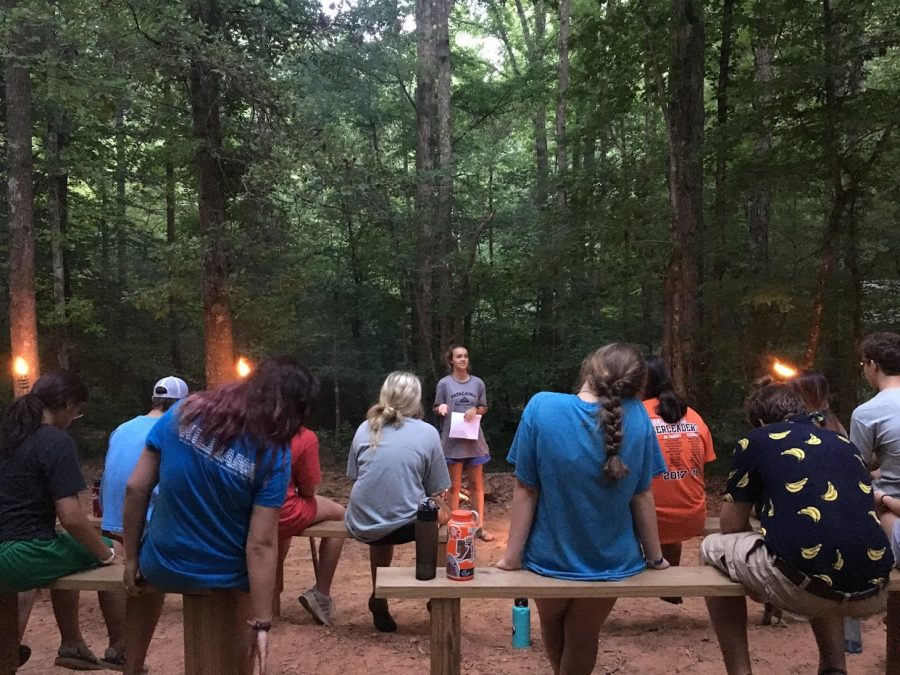In someone else’s shoes
Junior recounts experience living in simulated Third World
September 28, 2019
Rain crashes on the bamboo floor of our Philippine home. The walls quake with the occasional boom of thunder. I can make out the figures of girls who decided that it would be better to stand outside in the pouring rain rather than fight the constant battle of trying to fall asleep. They whisper among themselves about how wonderful it will be when this is over.
For the past three years, I have attended the Servants in Faith and Technology Learn and Serve Retreat in Lineville, Alabama. This week-long camp is specifically designed for international missionary training. This is done by entering a 48-hour simulation where you experience the life of someone in a Third World country.
After almost 12 hours of a cramped van ride with with seven other teens, singing the Backstreet Boys’ “I Want It That Way” at the top of their lungs, we make it to the camp, in the middle of nowhere. The place that we are to call home for the next six days. We barely began to unpack when an over enthusiastic swarm of counselors descends on us.
We are split amongst ourselves into smaller groups.
“This is your family for this week,” the counselor tells us.
They shove a singular potato sack in our hands and tell us to pack everything we will need for two days. Some people pack clothes and a toothbrush. Others grab a sleeping bag and bug spray.
The counselors lead us into the mass of untamed woods. We walk cautiously on logs over creeks and creaking bridges that we fear will collapse beneath us. We laugh and talk with our “family leaders” about Texarkana and guilty pleasure Netflix shows.
Our first sighting of the global village is customs. Men with machetes taking things out of our potato sack. Taking the very little we had. Treating us like animals. Some people lost everything. Others had nothing taken from them. At the end of the process, everyone was left with nothing more than a sleeping bag, their Bible and a journal.
We trek further into the woods and arrive at the heart of the Global Village. Signs point to the different houses, made from bamboo, stone and clay. My leaders lead us to the small building made of bamboo, labeled “The Philippines.”
“This is your home now,” the counselor tells us.
The rest of the evening is a blur. Collect firewood. Get to know each other. Start a fire after numerous fails. Play truth or dare. Cook the meager beans and rice portion our family was given over the fire. Tell funny stories. The night is restless. After dinner and worship, we are sent to sleep, sleeping bags in hand, on the spiny floor of the Philippines.
We awake with a start at the sound of shouts.
“The village next to you has burned. You must evacuate.”
We follow the strangely dressed man as he runs through the forest, up hills and across the creek. After running for ages, the rising sunlight welcomes us to our new location.
The Slums.
Overcrowded and over-polluted, the slums face us with the challenge of finding work, paying for food and finding a place to sleep for the night. If you are a man, you must build roads or work chopping firewood. If you are a woman, you scrounge for money and hope that you are not sold as someone’s property.
People dressed as citizens of the slums shun us and refuse us work as we enter. We fight other family groups for jobs and hope that we have enough money to make it to the next day. We work tirelessly for hours on end, but soon, the 48-hour timer is up. Our trip to the slums comes to an end
People sigh in relief and laugh with joy now that this horror has come to an end, and we will return to our world with of warm showers and an abundance of food.
Before we can return to our cabins, the counselors stop us. They tell us how happy they are that we made it through and how happy we must be now that this is done, but not everyone gets to leave. They tell us that some people in our world will never leave this kind of life.
They tell us: “We didn’t do this to you to make you feel guilty about what you have. But until you take a walk in someone else’s shoes and have empathy for them, you can’t be inspired to make a difference in this world.”















